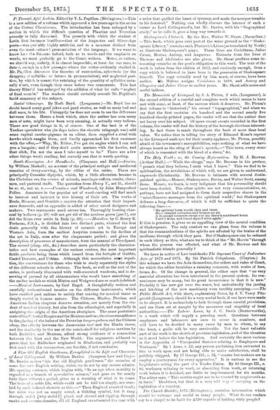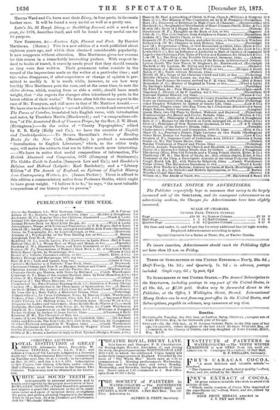We have to notice of Law text-books The Supreme Court
of Judicature Acts of 1873 and 1875. By Sir Patrick Colquhonn. (Clayton.) In this volume we have the Acts themselves, the orders and rules of Court, for which the editor furnishes a running comment, with scales of fees, forms, &c. Of the change in general, the editor says that "no very material alteration has been introduced in tho present system. Its con- veniences may be many, but its great inconvienco is that it is new." Probably it has now got over the worst, but undoubtedly the jarring and hitching of the now machinery were terribly annoying.—The Public Health Act, with short, explanatory Notes, by J. V. Vesoy Fitz- gerald (Longmans), should be a very useful book, if our laws were made to be obeyed. It is melancholy to look through these careful provisions, and see them set at naught by the meanness and stupidity of local authorities.—The Labour Laws, by J. C. Davis (Butterwortha), is a work which will supply a pressing need. Questions between employers and labourers are sure to occur in numbers, and will have to be decided in many cases by men to whom, to say the least, a guide will be very serviceable. Not the least valuable part of the work is the sketch of previous legislation, and of the situation as it stood before the late legislation. And certainly the most curious is the Appendix of " Unrepealed Statutes relating to Employers and Workmen." By 1 Anne, c. 22, any person purloining iron entrusted to him to work upon. and not being able to make satisfaction, shall be publicly whipped. By 17 George ILL, c. 55, "master hat-makers are to employ a journeyman for every apprentice." It is curious to see the Legislature acting the part of a Trades Union. By 43 George EL, a. 86, workmen refusing to work, or absenting from work, or returning work before it is finished, are liable to imprisonment for six months. The editor says, "This section ought not to be treated by magistrath as in force." Doubtless, but that is a very odd way of carrying on the legislation of a country.
The Church Builder, 1875 (Rivingtons), contains information which should bo welcome and useful to many people. What do our readers say to a chapel to be built for £120 capable of holding sixty people ? Marcus Ward and Co. have sent their Diary, in four parts, in its muds leather case. It will be found a very useful as well as a pretty one.
Leits's No. 32 Rough Diary, or Scribbling Journal, with a week on a page, for 1876, describes itself, and will be found a very useful one for its purpose.



































 Previous page
Previous page